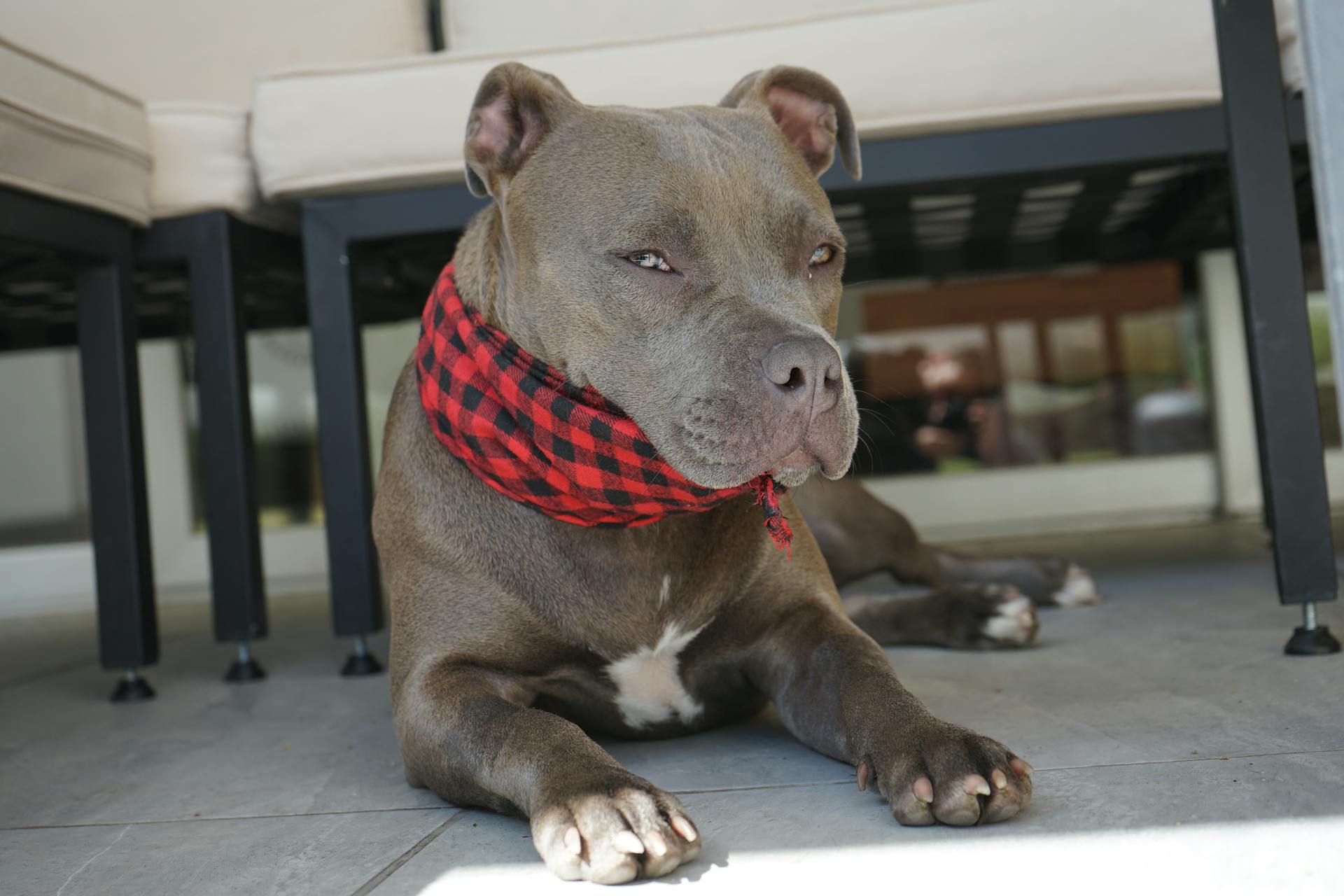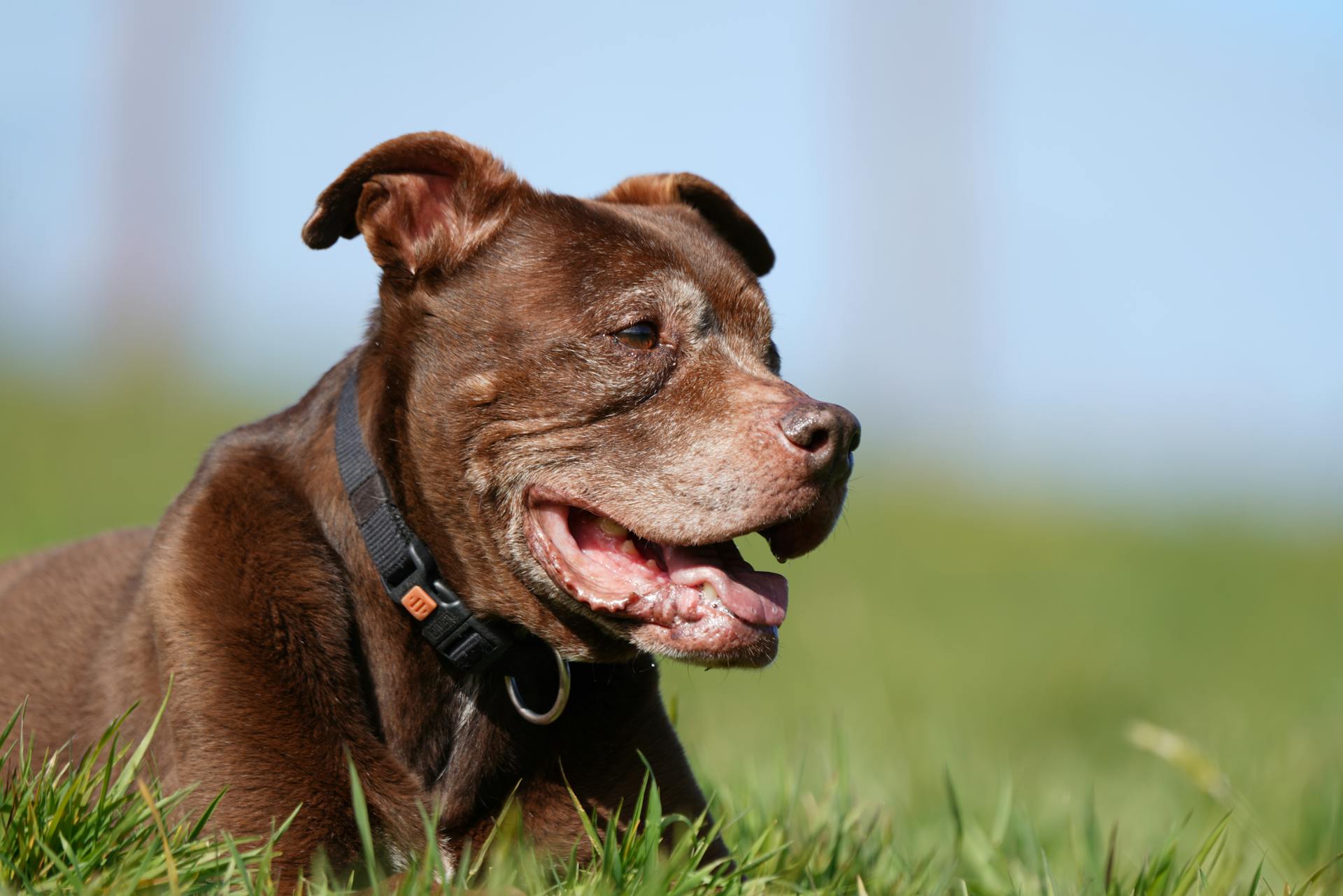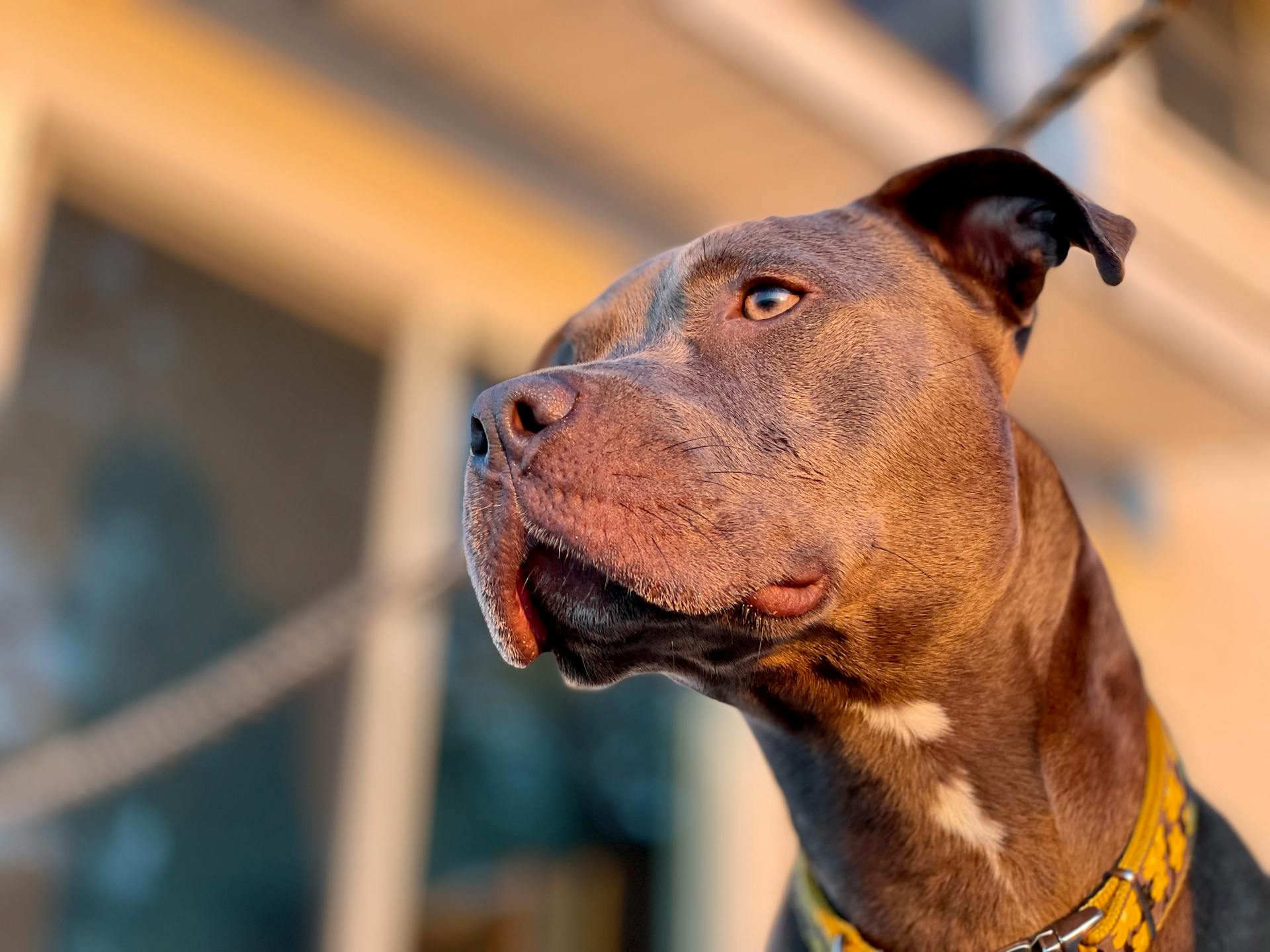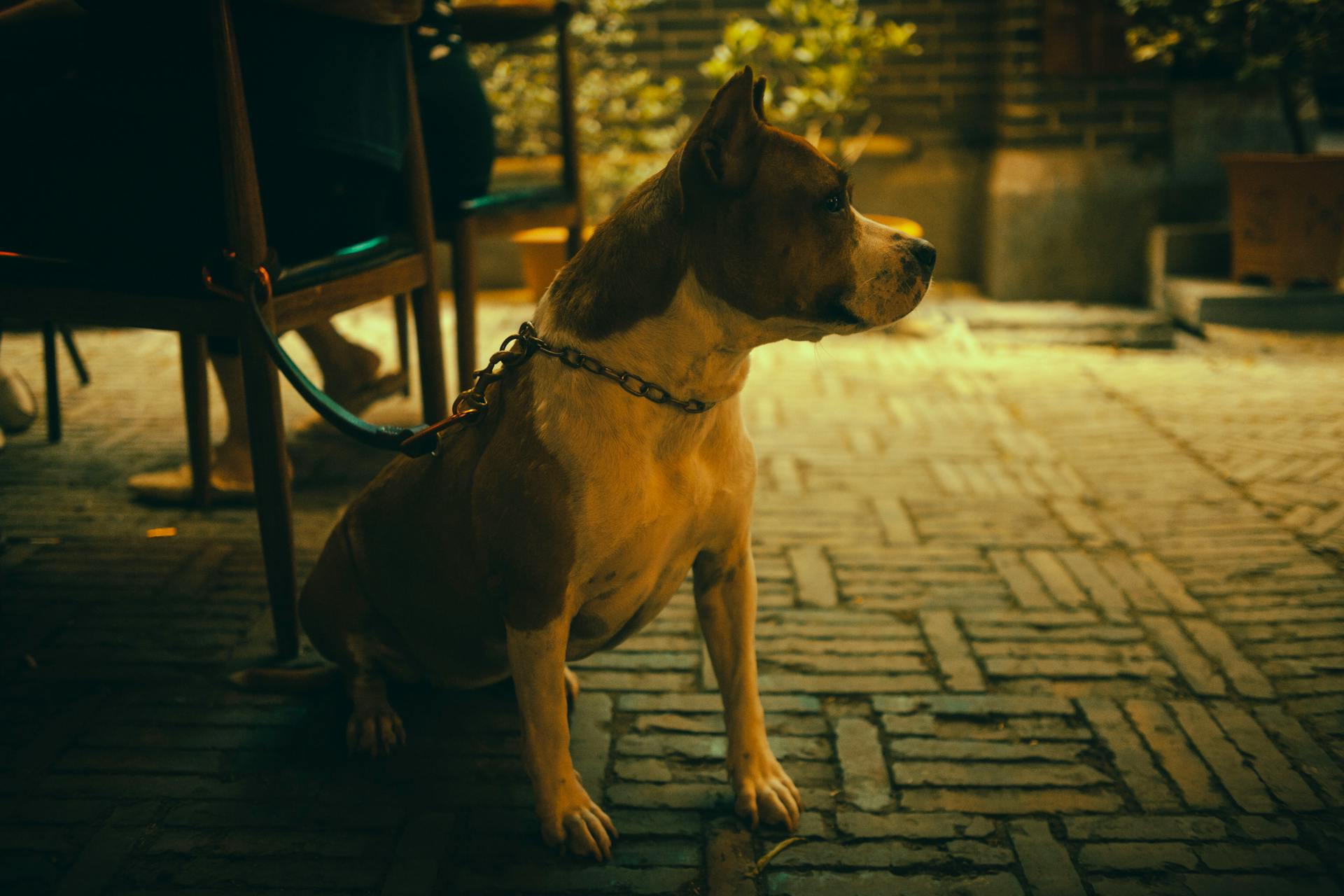
Pit bulls are often misunderstood and stereotyped, but they're also loving and loyal companions.
Insurance companies view pit bulls as a higher-risk breed due to their reputation for being aggressive.
Many homeowners and renters insurance policies exclude or limit coverage for pit bulls, or charge higher premiums for households that own them.
These exclusions or higher premiums can be a significant financial burden for pit bull owners.
Additional reading: Dog Liability Insurance for Pit Bulls
Insurance and Pit Bulls
If your insurer won't cover your dog, you have a few options to consider. Asking about exceptions, shopping around, and considering alternate insurance are good places to start.
Most homeowners assume that having a pitbull will increase their premiums, but that's not always the case. Insurance companies have a variety of ways to deal with the increased risk.
Pitbulls are at a higher risk for certain health and genetic conditions, such as hip dysplasia and myotonia. These conditions are usually treated with alternative therapies, ongoing medications, and surgery.
You can mitigate costs on your premiums by finding good insurance that covers your pitbull. Consider shopping around and asking about exceptions to find a policy that works for you.
Here's an interesting read: Pit Bulls and Children
Policy and Coverage
Not all insurance companies handle pit bulls the same way, so it's essential to review your current policy to understand the specifics of your coverage.
Does your policy have a section that talks about pets or dogs in particular? If so, take a close look to see if it mentions pit bulls or certain breeds of dogs. Check if there are any breed restrictions, liability claims, or requirements for signing a waiver.
Here are some key questions to ask yourself:
- Does your policy say anything about pit bulls or certain breeds of dogs?
- Are pit bulls totally banned, or can you own one as long as you jump through a few extra hoops?
- Do you need to sign a waiver saying you’ll cover all liability claims for your dog biting somebody?
Accident & Illness Plan Coverage Amount
A Spot accident & illness plan can cover a significant portion of eligible vet bills. For example, if you have a $1,500 eligible vet bill, the plan could cover up to $1,350 of that amount.
The amount a plan covers is determined by the reimbursement rate, which varies depending on the specific plan. In the case of a $1,500 eligible vet bill, the reimbursement rate would result in a $150 net payment to you.
You can expect to pay a deductible before the plan kicks in, but the reimbursement rate will help reduce the overall cost of your vet bills.
Review Policy
Reviewing your current policy is a crucial step in understanding how your insurance company views pit bulls. Fortunately, not all insurance companies handle pit bulls the same way, so you may be able to find a company that will still offer you good home insurance rates.
Take a close look at your home insurance policy, or review the plans you're considering if you don't have insurance yet. Check if your policy has a section that talks about pets or dogs in particular, and if it mentions pit bulls or certain breeds of dogs.
Here are some specific things to look for in your policy:
- Does your policy say anything about owning a dog or notifying the insurance company?
- Are pit bulls totally banned, or can you own one as long as you jump through a few extra hoops?
- Do you need to sign a waiver saying you'll cover all liability claims for your dog biting somebody?
If you can answer these questions, you'll have a better idea of what to do next and how your insurance company will react to your pit bull. Remember, policies can vary from company to company, so it's essential to review your policy carefully to understand your coverage.
Breed Discrimination and Laws
Dog breed discrimination is a complex issue, and it's essential to understand the laws surrounding it. In most states, breed discrimination is legal, which means insurance companies can deny coverage or charge higher premiums based on a dog's breed.
Insurance companies use breed-specific legislation to justify their decisions. This means that even if you have homeowners insurance, your liability claim may be denied if you're held responsible for owning a banned breed in your area.
Some states have laws that limit or eliminate breed discrimination. For example, Connecticut, Michigan, Nevada, New York, and Pennsylvania have passed legislation to restrict or ban breed-specific insurance policies.
Here are some states where breed discrimination is limited or banned:
Even with these laws in place, it's crucial to check your local regulations, as some cities and counties may have their own breed-specific bans.
Breed Discrimination Laws
Insurance companies can deny certain breeds due to risk exposure, with over 17,989 dog bite liability claims filed in 2021 resulting in over $882 million paid by home insurance carriers.
Some states have passed legislation to limit or eliminate breed discrimination by home insurance companies, including Connecticut, Michigan, Nevada, New York, and Pennsylvania.
In these states, insurance companies may not be able to deny coverage based on breed, but other requirements may apply, such as minimum liability insurance coverage.
Local cities and counties can also ban certain dog breeds, like Prince George's County, Maryland, where it's against the law to own a pit bull.
Even if you have homeowners insurance through a company that doesn't ban dog breeds, your liability claim may be denied if you're held legally responsible for owning a banned breed in your area.
Here are some states with limitations to breed discrimination or no breed discrimination:
- Connecticut
- Michigan
- Nevada
- New York
- Pennsylvania
Banned Breeds
Some insurance companies have a list of dog breeds they won't cover, and these breeds are often referred to as "banned breeds." These breeds are typically considered high-risk due to their size, strength, or aggressive tendencies.
Here's an interesting read: Breeds of Pit Bulls Chart
Certain breeds are more likely to be excluded from homeowners insurance, including Akitas, Alaskan Malamutes, and Pit bulls. In fact, Pit bulls are one of the most commonly excluded breeds.
Insurance companies may also exclude wolf breeds and dogs with thick chests, such as German Shepherds and Great Danes. These breeds are often associated with dog bites and liability claims.
If you own a banned breed, you may be able to find a dog-friendly home insurance company that will cover you. Some insurers will cover dogs of any breed as long as they don't have a history of biting.
Here are some states that ban breed discrimination in homeowners insurance:
- Colorado
- Connecticut
- Illinois
- Michigan
- Minnesota
- Nevada
- New York
- Pennsylvania
These states have passed legislation to protect dog owners from being discriminated against based on their breed. This means that insurance companies can't deny coverage solely because of the breed of your dog.
Intriguing read: American Bull Dog Pit
Costs and Risks
Owning a pitbull can come with some unique costs and risks. The breed is prone to certain health issues, including hip dysplasia, which can cost between $1,500 and $6,000 to diagnose and treat.
Some common health issues in pitbulls include elbow dysplasia, gastric dilatation volvulus (bloat), deafness, and myotonia. These conditions can be costly to treat, with estimates ranging from $100 to $7,500.
Pitbulls are also at a higher risk for hip and elbow disorders, which can be treated with alternative therapies, ongoing medications, and surgery. To help prevent bloat, consider making mealtime a game or using interactive feeders.
Here are some common Pit Bull health issues and their estimated costs to diagnose and treat:
In extreme cases, some insurance companies may not want to insure you if you own a pitbull, or their policy may come with certain restrictions.
Home and Property
Your homeowners insurance may not cover damage your dog causes to your home, belongings, or other structures on your property.
If your dog damages your home, belongings, or other structures, you won't get reimbursed to repair the damage or replace your belongings.
Your insurance company may not cover damage your dog causes to someone else's property if the dog is on the insurer's banned breed list.
Worth a look: 10 Reasons Why Pit Bulls Should Not Be Banned
Home and Property Damage
If your dog causes damage to your home, other structures, or personal property, the loss may not be covered by your homeowners insurance.
Your homeowners insurance won't cover a claim if your dog damages your home, belongings, or other structures on your property.
Damage to your home, such as chewing through drywall or destroying furniture, may not be reimbursed.
If your dog destroys your clothes, carpets, or other belongings, you won't get reimbursed to repair the damage or replace them.
Your insurance company may not cover damage your dog causes to someone else's property if the dog is on the insurer's banned breed list.
For another approach, see: Female Pitbull Dog
Why Does My Home Company Care About What I Own?
Your home insurance company cares about what you own because it's a key factor in determining your liability risk. Dog bites are the most common type of liability claim placed by homeowners.
Insurance companies view certain dog breeds as more likely to bite or injure someone, which increases their risk. This is why they take steps to manage the risk associated with these breeds.
If you own a dog breed that's considered high-risk, your insurance company may take extra precautions or charge higher premiums.
Related reading: Breeds Mistaken for Pit Bulls
Invest in Training

Invest in training for your dog, as it can save you money on premiums and convince your insurance company to take your dog on as a risk.
Investing in obedience classes and other training can give you the tools to prevent a bite claim from ever happening in the first place.
Records of your dog's obedience training or a letter from a vet or behaviorist asserting good behavior may help you negotiate with your insurance company.
Companies
Some insurance companies are more open to covering pit bulls than others. Fortunately, there's no industry-wide standard, so you can shop around to find a company that will offer you a good home insurance rate even with a pit bull.
AIG, Chubb, Encompass, Hippo, Safeco, State Auto, State Farm, and Plymouth Rock are known to cover dangerous dog breeds, including pit bulls, depending on your location and claims history.
You can review your current policy to see if it has a section about pets or dogs, and if it mentions pit bulls or certain breeds. If it does, take a close look at the fine print to understand the terms and conditions.
You might like: American Pitbull Terrier Types
Consider Alternative
If you're having trouble finding an insurance company that will cover your pit bull, it may be time to consider alternative insurance options.
One option is to look into umbrella insurance with another carrier. This type of policy can provide excess liability coverage when you exhaust the limits on your home or car insurance policy.
Make sure the umbrella insurer is aware of the breed restriction on your home insurance policy so they can confirm if it would cover your dog under the umbrella policy in case of a liability claim.
Consider switching to a canine liability, or pet liability, insurance policy. This policy will take the place of your homeowners liability coverage in the event of a liability claim.
Frequently Asked Questions
Will my homeowners insurance drop me if my dog bites someone?
No, your homeowners insurance will likely not drop you if your dog bites someone, but it's essential to review your policy to understand the specifics of your coverage
Sources
- https://www.agilerates.com/advice/home/home-insurance-with-a-pit-bull/
- https://www.policygenius.com/homeowners-insurance/which-dog-breeds-will-homeowners-insurance-not-cover/
- https://spotpet.com/breeds/dog-breeds/pit-bull
- https://www.embracepetinsurance.com/breed/pit-bull-pet-insurance
- https://www.usatoday.com/money/blueprint/home-insurance/dog-breeds-banned-home-insurance/
Featured Images: pexels.com


